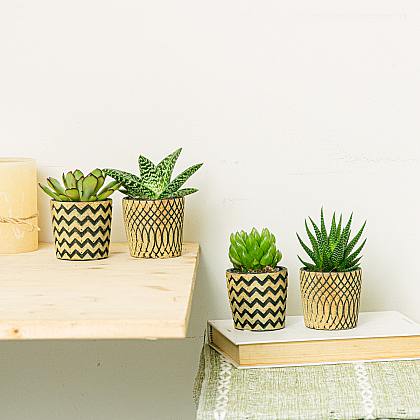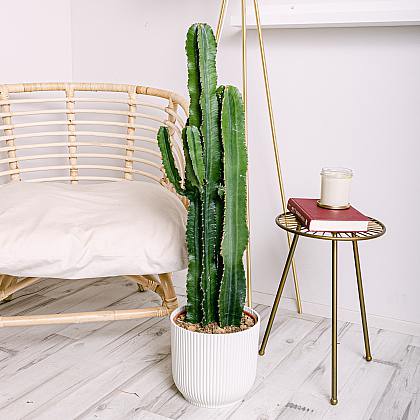Become an expert in houseplant care
Become a houseplant care expert and find out everything you need to know to keep your plants happy and healthy. In this article, we'll explore the benefits of...
Become a houseplant care expert and find out everything you need to know to keep your plants happy and healthy. In this article, we'll explore the benefits of having houseplants in your home, show you how to choose the right plants for your space, teach you how to water your plants properly, and give you tips on ideal light and temperature. You'll also discover how to choose the perfect soil and pots, learn how to feed your plants properly, and find solutions to combat common pests. Get ready to dive into the fascinating world of houseplant care!
The Benefits of Having Houseplants in Your Home
Having houseplants in your home is not only a way to decorate, but it also provides you with a number of benefits for your well-being. These little green beings can brighten up any space and fill it with life. In addition, houseplants are known to improve air quality by absorbing carbon dioxide and releasing fresh oxygen. This can help you breathe easier and feel more energized. Not only that, but they can also humidify the environment, which is especially useful in winter times when dry air can cause respiratory problems. Having plants at home can also be a way to reduce stress and promote relaxation. Watching them grow and bloom can be a therapeutic activity that helps you disconnect from the daily hustle and bustle. Additionally, taking care of your plants can give you a sense of accomplishment and satisfaction when you see them thriving under your care. So don't hesitate to add some houseplants to your home and enjoy all these benefits for your physical and emotional well-being.
Choose the right plants for your space
When choosing the right plants for your space, it's important to consider a number of factors. Not all plants are created equal, and each has its own needs for light, water, and space. If you have a small space, such as an apartment, you can opt for compact houseplants such as cacti, succulents, or ferns. These plants don't require a lot of space and can easily adapt to low-light conditions. If you have more space available, you can choose larger, bushier plants such as Monstera deliciosa or ficus benjamina. These plants will add a touch of freshness and life to your home. In addition to the size of the plants, you should also consider the amount of natural light your space will receive. If your home has a lot of light, you can opt for plants that require direct sun exposure, such as cacti and succulents. On the other hand, if your home receives little natural light, it's best to choose plants that are adapted to shady or low-light conditions, such as ferns or bromeliads. Remember that each plant has its own needs and it's important to do your research before purchasing. This will ensure that the plants you choose will suit your space and grow healthily.
How to Water Your Houseplants Correctly
Watering is one of the most important tasks in keeping your houseplants healthy and happy. While it may seem simple, watering properly can make the difference between a vibrant plant and one that wilts. The key is to find the right balance. You don't want to drown your plants with too much water, but you also don't want to leave them thirsty. Look for signs that tell you when it's time to water. If the floor is dry to the touch, it's time to give it some water. But make sure you don't overdo it. Too much water can lead to the development of diseases or root rot. Use a watering can or sprayer to avoid flooding the plant and allow excess water to drain properly. Remember that each plant has different watering needs, so it's important to do your research on the specific needs of each. When watering, do it with love and care, feeling the thrill of bringing your plants to life and watching them bloom in your home.
The Importance of Light and Temperature for Your Plants
Light and temperature are fundamental factors for the growth and development of houseplants. Plants need light to perform photosynthesis, a vital process in which they convert solar energy into food. That's why it's important to place plants near windows or in places where they receive direct light. If you don't have enough natural light, you can use artificial lights such as fluorescent lamps or plant-specific LEDs. In addition, it is necessary to take into account the right temperature for each type of plant. Some species prefer warmer temperatures, while others are better suited to cool environments. It is important to avoid sudden changes in temperature, as they can cause stress on plants and affect their growth. It is also essential to maintain good ventilation in the space where the plants are located, to avoid excess heat or humidity. See how your plants react to different levels of light and temperature, and adjust their conditions according to their needs. Remember that taking care of your plants also involves understanding their individual requirements and providing them with an environment that is conducive to their health and well-being. So don't underestimate the importance of light and temperature in caring for your houseplants.
Tips for choosing the ideal soil and pots
When caring for our houseplants, it is essential to choose the right soil and pots to ensure their health and growth. The first piece of advice I give you is to opt for a substrate that retains moisture but also allows good drainage. This will prevent the roots from rotting from overwatering. You can find special substrates for houseplants in specialty stores or even make it yourself by mixing peat moss, perlite, and vermiculite. When it comes to pots, it's important that they're the right size for each plant. If the pot is too small, the roots will not have enough room to grow and this will limit the development of the plant. On the other hand, if the pot is too large, excess soil can hold too much moisture and cause problems. In addition to the size, you should also consider the material of the pots. Clay pots allow for better air circulation and prevent excess moisture, while plastic pots are lighter and easier to clean. Always remember to place a plate under the pot to collect excess water and avoid staining your furniture. By following these tips, you'll be able to provide your houseplants with the ideal environment to grow strong and healthy. Go ahead and try it!
Keep Your Plants Healthy with Good Nutrition
To keep your plants healthy, it's essential to provide them with good nutrition. Just like us, plants need nutrients to grow and develop properly. A balanced diet will allow them to have strong, glossy leaves as well as vibrant, colorful flowers. How can you achieve this? First, make sure you're using a fertilizer that's suitable for your houseplants. There are different types of fertilizers on the market, such as organic or chemical. You can choose the one that best suits your needs and preferences. Additionally, it's important to follow the manufacturer's instructions for use to avoid overfeeding or damaging your plants' roots. Remember that the diet of your plants also depends on their growth stage. For example, during the flowering phase, you can use a phosphorus-rich fertilizer to promote the formation of lush flowers. Don't forget to water your plants regularly after applying the fertilizer, as this will help the nutrients to be properly distributed in the soil and absorbed by the roots. By keeping your plants well-fed, you'll be able to enjoy their beauty and vibrancy in your home. There's nothing more rewarding than watching them grow and thrive thanks to your care!
Solutions to Combat Common Pests in Houseplants
No one likes to see their houseplants infested with pests, right? It's like having unwanted guests in your home. But don't worry, there are solutions to combat these annoyances! One option is to use natural insecticides, such as neem oil or insecticidal soap. These products are effective at eliminating aphids, spider mites, and whiteflies without harming your plants or leaving toxic residue. Another alternative is the yellow sticky trap. These traps are great for catching fruit flies and thrips. Simply set a trap near your plants and watch them catch those pesky intruders. You can also try home remedies, such as soapy water or isopropyl alcohol diluted in water. Spray these solutions on the affected leaves and watch the bugs disappear. Remember to check your plants regularly for any signs of pests and act quickly. Don't let these little invaders ruin your green oasis. Keep your plants healthy and happy with these tips for combating common houseplant pests. Let's fight this battle together!
Become an expert in houseplant care and discover a new world full of life and beauty in your home! Now that you know the benefits of having houseplants, how to choose the right ones for your space, how to water them correctly, the importance of light and temperature, how to choose the ideal soil and pots, how to keep them healthy with a good diet, and how to combat common pests, you are ready to enter this exciting green world. Houseplants not only beautify our spaces, they also give us peace of mind, purify the air and connect us with nature. So don't hesitate to start taking care of your own plants and you will see how they surprise you with their growth and vitality. Dare to be an expert in houseplant care and discover the magic they can bring to your life! What will be the first plant you're going to add to your home?


